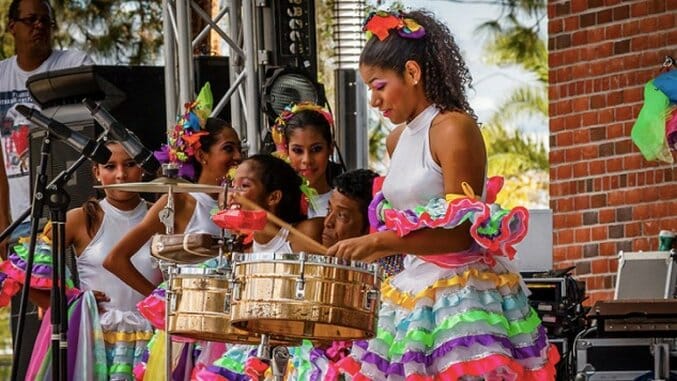Dispatches from Colombia: Battle of the Bandas

A musician friend here in Bogotá told me something once that perked up my gringo ears: “Every Colombian is a drummer.”
It feels true, genetic. I hear Colombian rhythms in dozens of places each day, the lively beating heart of a nation with the same wild mix of colors and cultures and ethnicities as you find in that throbbing musical groin of the USA—good old New Orleans.
In the Big Easy, sailors, settlers, and traders of white, black, Spanish, French, British, you name it, stock created a gumbo of colors and cultures. Here in Colombia, Europeans and blacks intermingled too, with an added spice, indigenous peoples.
You hear the mixed rhythms in the many musical expressions born—or borne along—on Colombian drumbeats: Vallenato. Cumbia. Porro. Joropo. Bambuco. Champeta. Pasillo. Mapalé. Tropipop. Bullerengue. Salsa, of course. Recently, reggaeton. And rock, pop, and musica romantica.
[CM note: New Orleans might well have had more Native American rhythms. But after Andrew Jackson took care of a little “British problem” in New Orleans in 1814, he moved on to cruelly end an “Indian problem” in the Southeast. Jackson rides a high horse in a square in New Orleans that bears his name, but ask Native Americans about The Trail of Tears (1938-1939) and see if they don’t support taking Old Hickory away in the dead of night, the way New Orleans recently did with its monuments to the Confederacy. Many Cherokees and Creeks may even suggest Colonel Jackson be dropped—high horse, pigeon-droppings, and all—off a bridge into the Mighty Mississip’.]
Whatever pulse of heritage can be credited, our 12-year-old, Juan Manuel, seems bound to make a mark for himself as a drummer, if he chooses.
One rainy, cold Friday a few weeks back, our whole family turned out to see Juanma in a battle of the bands—a Batuta de Plata, as it’s called—in a small stadium north of metro Bogotá.
Batuta means baton—the prize of silver carried off by the winner of this contest among bandas marciales, military-style bands, like the one at Juanma’s school, Gymnasio Moderno. The 11- to 18-year-old band members march to drums, trumpets, and xylophones. That’s it.
The bands wear smart uniforms trimmed in school colors (green and orange for Moderno), and the young musicians make a stirring sight spread out, 100 strong, in echelon over a soccer field.
Stakes are high in the annual event. Moderno, like the Crimson Tide in U.S. college football, lays claim to a tradition of excellence in band competition matched by few other private schools. In fact, only one, a bitter rival, has won as many Batutas in competition.
To get an idea of the pressures on these kids, consider this. In all Bogotá, a city of 11 million (more people than in the state of Georgia) Moderno arguably ranks among the best private educational institutions. All male, its founder a European-influenced visionary, the school this year alone has hosted two former Nobel literature laureates (J.M. Coetzee and V.S. Naipaul) and the world-renowned Colombian musical ensemble Monsieur Periné.
-

-

-

-

-

-

-

-

-

-

-

-

-

-

-

-

-

-

-

-

-

-

-

-

-

-

-

-

-

-

-

-

-

-

-

-

-

-

-

-








































